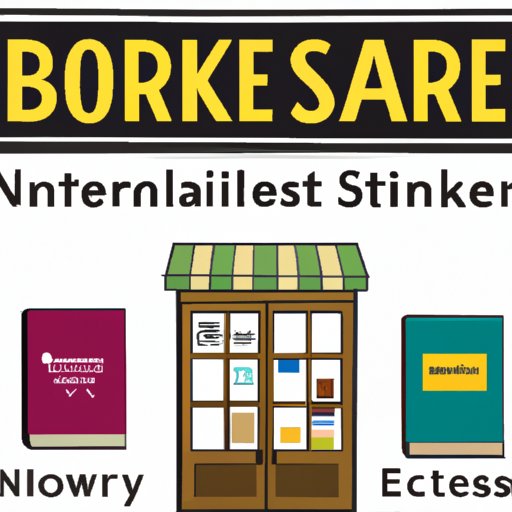
Introduction
Barnes and Noble, one of the most prominent bookstore chains in America, has been struggling in recent years. As the traditional bricks-and-mortar bookseller faces challenges in a digital age, there is growing concern that Barnes and Noble may be going out of business. This article explores the potential closure of Barnes and Noble and its implications for the reading and writing community.
The End of an Era: Is Barnes and Noble Going Out of Business?
Founded in 1886, Barnes and Noble has been a cornerstone of the book industry for over a century. Despite its storied history, the company has faced increased competition from e-commerce giants like Amazon and changing consumer habits. Speculation about Barnes and Noble’s possible closure has been rampant in recent years, and the company has struggled to turn things around. If this iconic bookstore goes out of business, it would be a significant loss for the reading and writing community.
Barnes and Noble’s Struggle to Survive in the E-Commerce Era
Barnes and Noble’s woes can be traced back to the rise of e-commerce and the increasing popularity of digital books. While the company initially attempted to adapt to these changing market conditions with the launch of the Nook e-reader in 2009, this effort proved unsuccessful. Barnes and Noble has also faced criticism for its failure to effectively compete with Amazon on price, shipping times, and customer experience. Despite these challenges, the company has made a number of other attempts to reposition itself in the market, including adding cafes, hosting author events, and expanding its selection of non-book merchandise.
The Future of Bookselling: What Does the Possible Closure of Barnes and Noble Mean?
Barnes and Noble’s closure would have significant implications for the book industry, particularly for readers, writers, and publishers. While it is difficult to predict exactly what would happen in the event of Barnes and Noble’s closure, it is likely that independent bookstores and online retailers would fill some of the gap. In recent years, independent bookstores have experienced a resurgence, and readers have become increasingly interested in supporting local businesses. However, it is important to note that independent booksellers face their own challenges, particularly in competing with online retailers on price and convenience.
Another trend shaping the book industry is the rise of e-books, audiobooks, and self-publishing. These formats have become increasingly popular, with many readers opting for the convenience of digital books over physical copies. Self-publishing has also become more accessible, allowing writers to bypass traditional publishing channels and reach readers directly. While these trends are reshaping the industry, it remains unclear how they will impact the broader culture of reading and writing.
The Decline of Physical Bookstores and the Rise of Indie Booksellers
The rise of independent bookstores has been one of the few bright spots in an otherwise tumultuous time for the book industry. Unlike national chains like Barnes and Noble, independent bookstores are typically owned and operated by members of the surrounding community. This allows them to offer personalized service, niche book selections, and a sense of community that is often lacking in larger stores. However, indie bookstores face their own challenges in competing with larger chains and online retailers.
The Role of Corporate Greed in Barnes and Noble’s Woes
Barnes and Noble’s decline can also be attributed to a number of business and management decisions that prioritized short-term profits over long-term sustainability. The company has been criticized for a number of practices, including aggressive expansion, debt-financed stock buybacks, and underinvestment in technology. Critics argue that these decisions ultimately harmed the company’s ability to adapt to changing market conditions and meet the needs of its customers and employees.
What Can We Learn from Barnes and Noble’s Struggle to Survive?
Despite the challenges facing Barnes and Noble and other bricks-and-mortar businesses in the digital age, there are lessons to be learned from their experiences. Innovation, customer service, and community building are key to surviving in a changing market. Businesses that prioritize these areas are more likely to stay relevant and meet the evolving needs of their customers. Additionally, embracing new technologies and investing in a diverse range of revenue streams can help businesses weather economic and industry changes.
Goodbye Barnes and Noble: Memories of a Bookstore Chain We Loved
For many readers and writers, Barnes and Noble has been an important part of their lives. From browsing the shelves for hours on end to attending book clubs and author readings, the bookstore has been a haven for book lovers. As we contemplate the possible closure of Barnes and Noble, it is important to reflect on the history and cultural significance of this iconic bookstore chain. Whatever its fate, Barnes and Noble will always hold a special place in the hearts of those who love books.
Conclusion
Barnes and Noble’s potential closure has stirred up complex emotions for those in the reading and writing community. While it is unclear what the future holds for this iconic bookstore chain, it is clear that the book industry is undergoing significant changes and challenges. However, by learning from Barnes and Noble’s experience, businesses can develop strategies to stay relevant and meet the evolving needs of their customers in a digital age.





